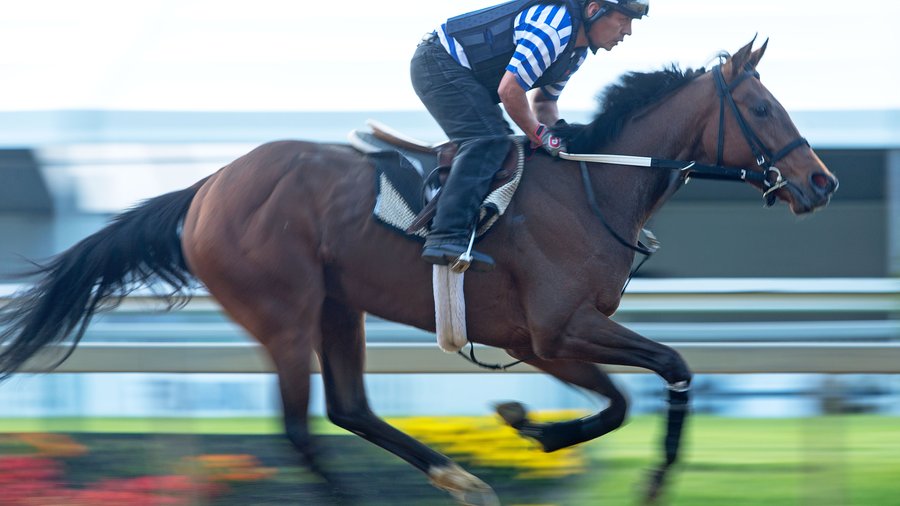Plans to open a year-round off-track betting parlor at the Maryland State Fairgrounds for wagering on horse races across the U.S. is being met with protest by some residents and legislators.
The Maryland Jockey Club filed an application with the Maryland Racing Commission on Dec. 31 to open the parlor on Feb. 1 in the grandstand of the Timonium landmark, said J. Michael Hopkins, executive director of the commission.
The jockey club plans to operate the OTB parlor — that would consist of about 90 video screens and teller windows — and would share proceeds with the Maryland-bred Fund and the Purse Account to help promote horse racing in the state, said Cricket Goodall, executive director of the Maryland Horse Breeders Association.
The Horse Breeders Association administers the Maryland-bred Fund while the Maryland Jockey Club oversees the Purse Account, Goodall said.
"They are trying to capture as much of the market as they can," Hopkins said, of the OTB efforts.
Hopkins said the proposed venture is now delayed until at least Feb. 11 after a public meeting is held with residents who live near the Maryland State Fairgrounds.
That hearing is scheduled to begin at 6 p.m. at the fairgrounds and Hopkins said the nine-member commission could vote on the application that day, or wait to vote at its next regularly scheduled meeting on Feb. 16 in Laurel.
An earlier public meeting on the application was scheduled for Jan. 22, but was postponed because of the blizzard that hit the region that day.
State Sen. James Brochin, whose 42nd District includes the Timonium community and the fairgrounds, has intervened to try to help the community.
On Jan. 28, he sent a letter to Attorney General Brian Frosh outlining his concerns that said, in part: “As you can imagine, my constituents are quite shocked that with no input, hearings or notice the Maryland Jockey Club and the Timonium Fairgrounds can get away with this.”
The letter asks Frosh to render an opinion on whether the off-track betting parlor would constitute an expansion of gambling in the state, which could only be approved through a referendum.
David Nitkin, a spokesman for Frosh, said Monday that lawyers in the Attorney General's Annapolis office were reviewing the issues raised in Brochin's letter.
Sal Sinatra, general manager of the Maryland Jockey Club, declined to comment on Monday.
On Jan. 29, Baltimore County Executive Kevin Kamenetz said he was aware of the move by the Maryland Jockey Club to install the betting parlor, but had no comment because he believed the issue was in the purview of the state.
Meanwhile, Andy Cashman, general manager at the state Fairgrounds, said he met with state representatives and some community groups on Jan. 29 to try and open a dialogue.
Cashman said the Jockey Club estimates there will be about 50 patrons at the off-track betting parlor daily, with more on big racing days like the running of the Kentucky Derby and Preakness Stakes.
There has been OTB offered at the fairgrounds since the 1980s during the 10 days of the annual Maryland State Fair in August, Cashman said.
Of the efforts to expand that to 365 days, he said: “We are trying to have meetings with residents before that (Feb, 11) meeting to talk about it and explain it. We are trying to get together and work it out.”
Shawn G. Blair, president of the Stratford Community Association, a residential community located near the fairgrounds, said on Monday that his group was opposed to the OTB operation in part because it could lead to a decrease in their property values and ruin the family atmosphere of the fairground site.
Russ Stout, president of the Pine Valley-Valleywood Community Association, a residential community near the site, said residents are upset because they believe such an addition will increase traffic and possibly lead to more expanded gambling there like slot machines in the future.
Hopkins said he had advertised the Jan. 22 meeting in a public notice published in The Baltimore Sun in early January, but Stout said he and others in the community were unaware of the that meeting, and became suspicious about the venture when word got around that OTB screens had already been installed in the grandstand.
“It looks like they tried to sneak it in. We found out purely by happenstance,” Stout said.
Stout said the suburban communities had been wary of any kind of gaming at the fairgrounds other than the off-track betting that is allowed there during the 10 days of the annual Maryland State Fair, held in August.
The community pushed back any possibility that slot machines could be located at the fairgrounds after casinos were legalized in Maryland.
“Gambling there has been a concern,” he said, of the fairgrounds “We recognize that horse racing is important to our state’s history, but we see the off-track betting as a possible gateway to slot machines.”
Cashman said the off-track betting parlor would be open from 11 a.m. to 7 p.m. Monday through Wednesday and from 11 a.m. to 11 p.m. the remaining days of the week. It would feature horse races from across the U.S. From some of the most famous tracks like Churchill Downs, Saratoga and Gulf Stream.
Representatives from the Maryland State Fair have applied for a year-round liquor license to help support the off-track betting venture, according to a Jan. 19 letter sent to Brochin from the property’s lobbyist Nancy Hill.
